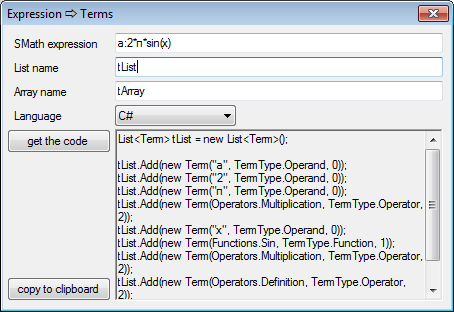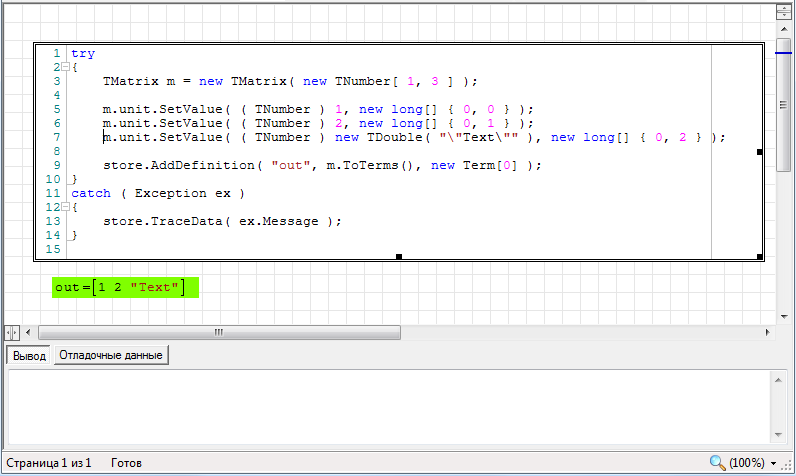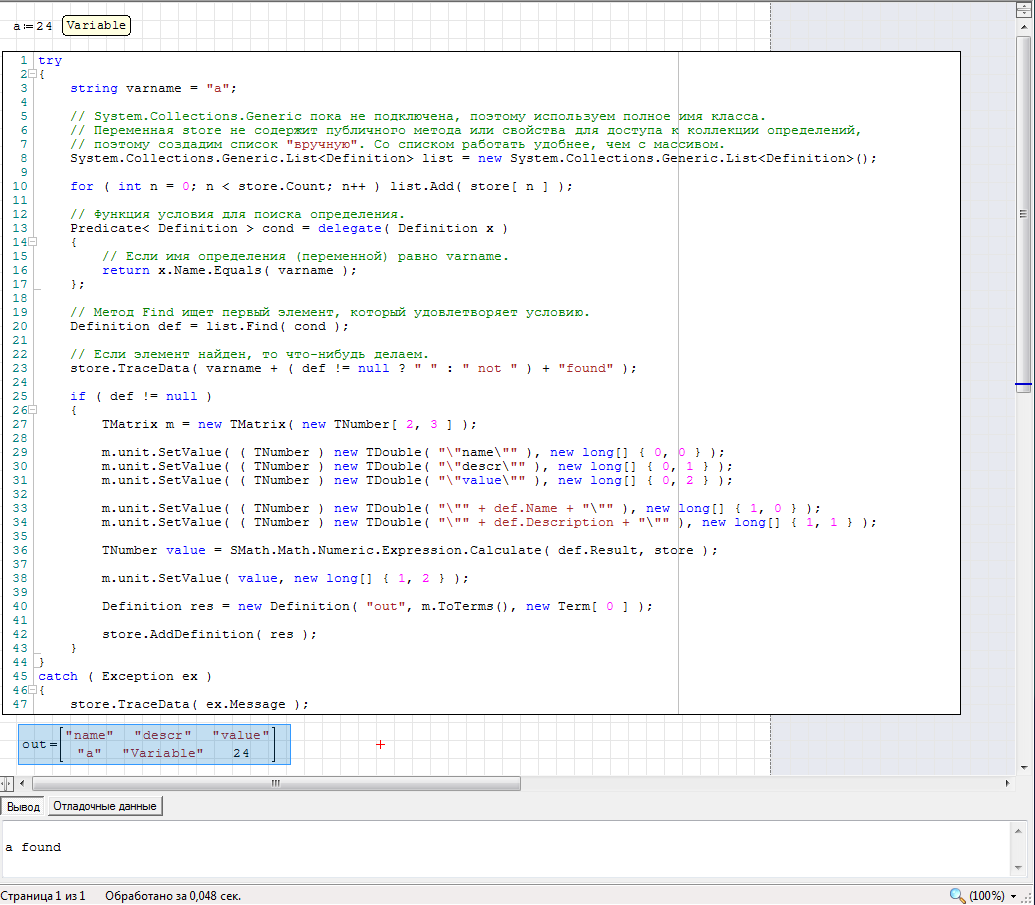how to know the name of the variable - Messages
for example
Count = 5
I can get the type of the variable
GetType(Count)="number"
I can get the value as a string
var2str(Count)="5"
I can even get a description of the variable
description(Count)="TestDescription"
I need to get the variable name "Count" as a string
With best wishes
You can't. If Count is defined (IsDefined(Count)=1), his value is replaced before being passed as argument in any function, hence the name cannot be retrieved. Why you need this? Maybe we can help you to find an alternative way to do the same or a similar task.
For my program StandardProject
(see the topic in Extensions)
For data exchange
the user generates a matrix
In the columns which
1 column - the name of the variable as a string
2 column - variable value as double
3 column - description as a string
to simplify and reduce errors
I was planning to write a function
which input received the list of variables
and the output was formed by the above matrix
With best wishes!
P.s.
if you're interested as implemented
watch the video
https://yadi.sk/i/GT_K4LXm3EhvAq
the full set of videos
https://yadi.sk/d/0aXk5NGQ3EhvUo
WroteI was planning to write a function
which input received the list of variables
and the output was formed by the above matrix
unfortunately this won't work; once passed through the function even descriptions will be lost (because the values are passed on evaluation, inside the function nothing is known but the values).
![2017-02-27 16_38_07-SMath Studio 0.98.6260 - [Page1_].png](/en-US/files/Download/MYZbTb/2017-02-27-16_38_07-SMath-Studio-0.98.6260---[Page1_].png)
My suggestion is to create a function f(name,description,value) to create your matrix; function can be extended to 3 lists using vectorize() (or built directly to handle vectors). (or you can try to follow the hint given by uni).
I also think that use the method proposed uni
To uni
but I can't understand how to write scripts
I propose to start with the basics
from a script to get Smath Studio any value
while it turns out to show only variables in the debug panel (the output window)
К Вячеславу
пока не могу понять как писать скрипты
предлагаю начать с азов
как из скрипта получить в Smath Studio любое значение
пока получается показать переменные только в панели отладки (окно вывода)
Проблема в том, что нужно очень точно представлять результат, чтобы описать алгоритм в скрипте. Для этого лучше сначала написать функцию в виде дополнения, отладить её, а потом поместить в скрипт. Поэтому пользоваться этим инструментом полноценно пока могут лишь разработчики дополнений, которые знакомы с документацией.
Я попробую набросать что-нибудь работающее.
Буду очень признателен.
Wrote
Проблема в том, что нужно очень точно представлять результат, чтобы описать алгоритм в скрипте. Для этого лучше сначала написать функцию в виде дополнения, отладить её, а потом поместить в скрипт. Поэтому пользоваться этим инструментом полноценно пока могут лишь разработчики дополнений, которые знакомы с документацией.
Я попробую набросать что-нибудь работающее.
Just for curiosity and without any insight into real plugin-coding: Isn't the programmatic representation of the expressions as required in the script region that what the "Expression -> terms" dialog in the Development tools produces?
Is there a need to change the values for "List name" and "Array name"?

Example 1.
try
{
TMatrix m = new TMatrix( new TNumber[ 1, 3 ] );
m.unit.SetValue( ( TNumber ) 1, new long[] { 0, 0 } );
m.unit.SetValue( ( TNumber ) 2, new long[] { 0, 1 } );
m.unit.SetValue( ( TNumber ) new TDouble( "\"Text\"" ), new long[] { 0, 2 } );
store.AddDefinition( "out", m.ToTerms(), new Term[0] );
}
catch ( Exception ex )
{
store.TraceData( ex.Message );
}
WroteThere are several ways how to use Script region.
Example 1.try { TMatrix m = new TMatrix( new TNumber[ 1, 3 ] ); m.unit.SetValue( ( TNumber ) 1, new long[] { 0, 0 } ); m.unit.SetValue( ( TNumber ) 2, new long[] { 0, 1 } ); m.unit.SetValue( ( TNumber ) new TDouble( "\"Text\"" ), new long[] { 0, 2 } ); store.AddDefinition( "out", m.ToTerms(), new Term[0] ); } catch ( Exception ex ) { store.TraceData( ex.Message ); }
...it is quite sad/frustrating not to understand better its usage ...just to organize to give it a try.
Franco
it's great
how do I output the variable in the field Smath Studio - understand
Question
1. how to get a specific variable from Smath Studio
2. is it possible to imagine a script as a function Smath Studio
for the subsequent call as a "normal" function Smath Studio
Перевод
это отлично
как вывести переменную в поле Smath Studio - понял
Вопрос
1. как получить конкретную переменную из Smath Studio
2. можно ли скрипт представить в виде функции Smath Studio
для последующего вызова как обычной функции Smath Studio
try
{
string varname = "a";
// System.Collections.Generic пока не подключена, поэтому используем полное имя класса.
// Переменная store не содержит публичного метода или свойства для доступа к коллекции определений,
// поэтому создадим список "вручную". Со списком работать удобнее, чем с массивом.
System.Collections.Generic.List<Definition> list = new System.Collections.Generic.List<Definition>();
for ( int n = 0; n < store.Count; n++ ) list.Add( store[ n ] );
// Функция условия для поиска определения.
Predicate< Definition > cond = delegate( Definition x )
{
// Если имя определения (переменной) равно varname.
return x.Name.Equals( varname );
};
// Метод Find ищет первый элемент, который удовлетворяет условию.
Definition def = list.Find( cond );
// Если элемент найден, то что-нибудь делаем.
store.TraceData( varname + ( def != null ? " " : " not " ) + "found" );
if ( def != null )
{
TMatrix m = new TMatrix( new TNumber[ 2, 3 ] );
m.unit.SetValue( ( TNumber ) new TDouble( "\"name\"" ), new long[] { 0, 0 } );
m.unit.SetValue( ( TNumber ) new TDouble( "\"descr\"" ), new long[] { 0, 1 } );
m.unit.SetValue( ( TNumber ) new TDouble( "\"value\"" ), new long[] { 0, 2 } );
m.unit.SetValue( ( TNumber ) new TDouble( "\"" + def.Name + "\"" ), new long[] { 1, 0 } );
m.unit.SetValue( ( TNumber ) new TDouble( "\"" + def.Description + "\"" ), new long[] { 1, 1 } );
TNumber value = SMath.Math.Numeric.Expression.Calculate( def.Result, store );
m.unit.SetValue( value, new long[] { 1, 2 } );
Definition res = new Definition( "out", m.ToTerms(), new Term[ 0 ] );
store.AddDefinition( res );
}
}
catch ( Exception ex )
{
store.TraceData( ex.Message );
}
WroteTo uni
it's great
how do I output the variable in the field Smath Studio - understand
Question
1. how to get a specific variable from Smath Studio
2. is it possible to imagine a script as a function Smath Studio
for the subsequent call as a "normal" function Smath Studio
Перевод
это отлично
как вывести переменную в поле Smath Studio - понял
Вопрос
1. как получить конкретную переменную из Smath Studio
2. можно ли скрипт представить в виде функции Smath Studio
для последующего вызова как обычной функции Smath Studio
2. Как функцию представить нельзя.
П.С. Теоретически можно написать дополнение, в котором можно использовать написанную функцию и потом вызывать её многократно как стороннюю. Я бы мог даже добавить кнопку в компоненте Скрипт, по которой формировалась сборка, но это всё сложно и целая эпопея.
Возникли проблемы
при использовании Лист.exe файл - исполняемый
1. Не обновляется поле из out переменной (выходной)
2. При перемещения тела скрипта в Область и последующим скрытием Области
при запуске Лист.exe файл - появляется сообщение - No 'Tech.CodeGenaration.dll' found in 'Лист'.
Из папки с плагином (%user%\Application Data\SMath\extensions\plugins\20ad815b-bc5e-487d-9258-57fde2ac6de8\0.1.5997.41919\):
IronPython.dll
IronPython.Modules.dll
Microsoft.Dynamic.dll
Microsoft.Scripting.dll
Microsoft.Scripting.Core.dll
Microsoft.Scripting.Debugging.dll
Microsoft.Scripting.ExtensionAttribute.dll
Tech.CodeGeneration.dll
Из места установки программы:
SMath.Controls.dll
SMath.Manager.dll
SMath.Math.Numeric.dll
SMath.Math.Symbolic.dll
Вообще, вам лучше научиться писать плагины самому, тогда не нужно будет искать других путей. Ваша задача не решаема стандартными средствами SMath Studio.
- New Posts
- No New Posts

![2017-03-01 11_41_51-SMath Studio - [Page1_].png](/en-US/files/Download/7ZSczu/2017-03-01-11_41_51-SMath-Studio---[Page1_].png)
